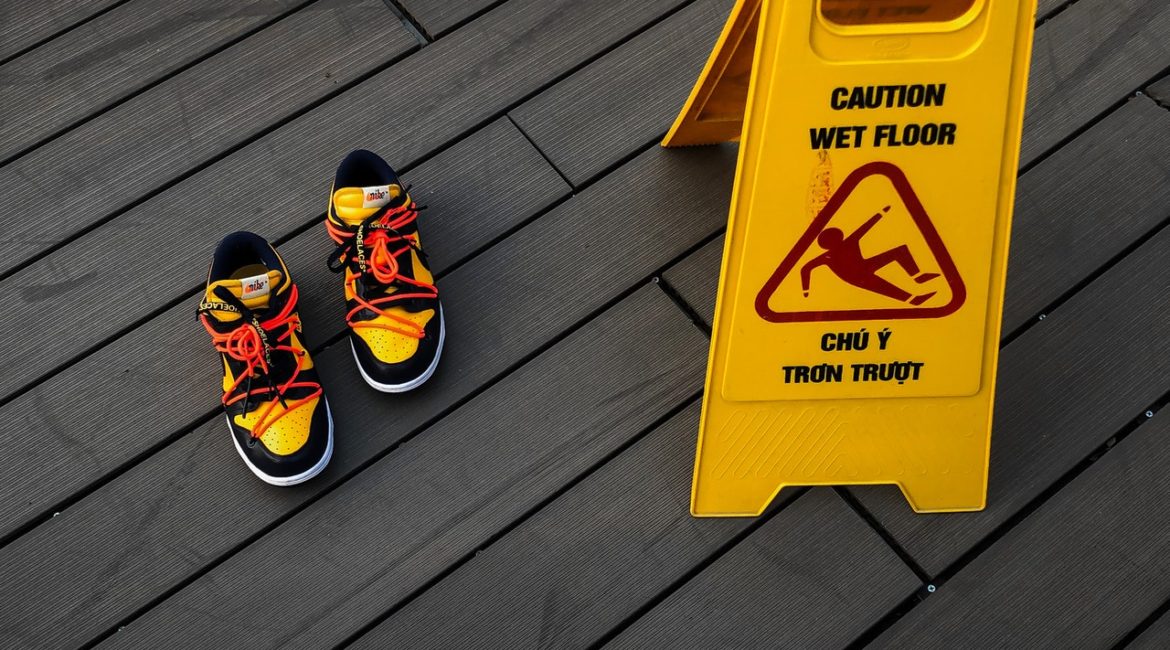A number of factors determine a slip and fall case’s worth. A competent slip and fall attorney knows that there is no simple formula to determine a case’s value. However, there are some major factors that play large roles in determining a slip and fall claim’s value.
It is important to remember that slip and fall accidents are very different from car accidents. In a car accident, liability is often relatively straightforward. Perhaps one person rear-ended another or there was a failure to yield involved. However, who is liable for a fall injury is much less cut and dry.
In any personal injury case, the claimant (or their attorney) has to prove four elements: duty, liability, causation, and damages. In a premises liability (such as a slip and fall) case, liability is the most crucial element.
What are the Property Owner’s Duties?
Slip and fall accidents can happen anywhere. The most common ones take place in people’s homes and businesses. When a fall happens at someone’s home, we have to examine the reason the victim was there. Then we can determine the duties owed to that person. There are three classes for victims in this scenario:
- Invitee – a person who has permission from the property owner (whether expressed or implied) to be on the premises. Property owners owe invitees the highest degree of care. This includes the duty to make the property reasonably safe from hazards the owner knew or should have known about. Almost all slip and falls that occur at supermarkets or department stores involve invitees.
- Licensee – a person who has permission to be on the property. The owner has the duty to warn licensees of any non-obvious dangers on the property of which they are aware.
- Trespasser – a person who enters a property without permission. Property owner’s don’t owe a duty of care to trespassers other than a duty not to injure them on purpose.
Therefore, to begin to assess a slip and fall case’s worth, a slip and fall lawyer and an insurance company will first assess the victim’s status at the time of the fall. As an example, if Walmart is open, they are inviting customers into the store. Walmart then owes its customers the highest duty of care. That is, to ensure that the property is safe.

The Role of Liability in Determining a Slip and Fall Case’s Worth
It seems simple to most injury victims. The victim slipped and fell at the grocery store. In fact, the victim even slipped and fell on water that was on the floor. To most, this is an obvious case and the grocery store should pay for the victim’s damages.
But in order to prove a property owner liable for injuries suffered as the result of a hazard such as water left on the floor, the claimant must prove that the owner (or its representatives) knew or should have known about the hazard.
In practice, that means that if the water was very recently spilled by a customer, the property owner would not be liable for the slip and fall. In a scenario such as this, the victim would have a case that is not worth anything.
But notice how the rule requires the owner of a property to remove hazards they knew or should have known about. This means that the property owner cannot simply choose to never inspect their property thus leaving hazards everywhere. Instead, the law expects the owner to be vigilant in maintaining their property.
Thus, in a similar scenario to the one described above: imagine a person slipped and fell on water at the grocery store. Except, someone spilt the water 15 minutes prior to the fall. In this scenario, an experienced injury lawyer can make a compelling argument that had the owner done their duty, they’d have discovered and cleaned up the water.
Insurance companies will often act as if liability in a slip and fall case is clear. However, an experienced slip and fall law firm knows that liability analyses are often fact specific. These analyses require a thorough investigation early on to build the liability argument.
Causation Affects a Slip and Fall Case’s Worth
This aspect of a slip and fall case analysis is very similar to that of a car accident. The essential question is did the incident in question cause the injuries that are being claimed by the victim. Proving this element will often require your slip and fall lawyer to hire experts. Causation experts often opine on whether the fall as it happened could have caused the claimed injuries.
Injuries that commonly occur in slip and fall cases are:
- Broken wrists and hips
- Traumatic Brain Injuries
- Neck and back injuries
- Tendon and ligament injuries
However, the largest factor in determining value for a slip and fall case is the damages those injuries caused the victim to sustain.
For what types of Damages can a Slip and Fall Victim Recover?
Slip and fall victims can recover for a number of damages. These damages include:
- Medical bills – the property owner and their insurance company is responsible for a victim’s medical bills incurred as a result of the slip and fall.
- Future medical care – if a slip and fall victim has an ongoing need for future care, the expenses expected to be incurred in that treatment is the responsibility of the property owner and their insurance company.
- Lost wages – any money lost by the victim as a result of missed work caused by the fall is the responsibility of the property owner and their insurance company.
- Loss of future earning capacity – sadly, some slip and fall victims will suffer injuries that prevent them from working in their chosen field (or at all) in the future. These victims must be compensated for the money they lost in the future as a result of their slip and fall accident.
- Other out of pocket expenses – these are expenses incurred as a result of the fall that don’t fall into the category of medical expenses
- Pain and suffering
- Mental anguish
- Loss of enjoyment of life – many slip and fall accident victims are unable to participate in hobbies they enjoyed prior to their fall. These victims are owed compensation by the property owner and their insurance company when they lose out on these types of activities.
- Permanent disability or disfigurement – a victim can recover from the insurance company for the disability or disfigurement.
These factors largely determine a slip and fall case’s worth. In a case where a customer at a store clearly slipped and fell on a hazard that the store owner knew about would make a small recovery or no recovery at all if their injuries from the fall were minimal.
Call Knapp Accident & Injury Law
Insurance companies often require slip and fall accident victims to file a lawsuit to get proper compensation. This is quite a different from car accident cases. That is why many firms that avoid litigation shy away from slip and fall cases. A slip and fall accident victim needs to hire a lawyer that is not afraid to hold the insurance company’s feet to the fire and file a lawsuit when necessary.
If you or a loved one has been injured in a slip in fall accident, call us today for a free consultation. Knapp Accident & Injury Law is dedicated to getting you the compensation you deserve for your injuries.

